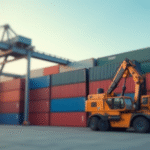Introduction
While it’s premature to declare a global recession just around the corner, the slowdown in world trade and heightened political uncertainty will undoubtedly curb growth in the coming months. Each country must brace for the worst by preserving its economic policy maneuverability.
The Global Trade Landscape
US Economy: The US economy showed promising signs of stabilization earlier in 2025, with robust production and employment growth. However, President Donald Trump’s trade policies have disrupted global commerce and fueled market turbulence, undermining growth prospects. Trump’s announcement of “reciprocal” tariffs on nearly all US trading partners in April destabilized financial markets, and subsequent pauses in tariffs have done little to mitigate the impact. The uncertainty has severely eroded consumer confidence and is likely to negatively affect business investment and job growth. As trade tariffs increase US consumer costs and drive inflation, the Federal Reserve’s ability to support the economy and prevent financial turbulence will be limited.
Eurozone Economy: The eurozone economy continues to operate in two lanes. Key countries like Austria, France, and Germany show underperformance and face significant fiscal pressures, especially as political unrest raises financing costs. Meanwhile, Greece, Italy, Portugal, and Spain have fared better. The escalating trade tensions are likely to negatively impact major manufacturing powers, while Japan and the UK have experienced moderate growth that may soon falter due to underlying vulnerabilities, limited policy maneuverability, and exposure to global trade tensions.
China’s Economy: China, which had shown signs of stabilization, now faces a significant challenge. Its growing industrial capacity hasn’t been matched by domestic demand, and it’s now engaged in an open trade war with the US. China has responded with retaliatory tariffs and measures aimed at harming the US economy. However, this strategy has limitations due to weak Chinese consumer demand and other countries’ eagerness to avoid a flood of Chinese exports.
Emerging and Developing Economies
The double blow of US tariffs and growing overcapacity in China will severely hamper growth in emerging and developing economies, particularly those heavily reliant on exports (like Southeast Asia). Meanwhile, trade disruptions, rising debt servicing burdens, and reduced foreign aid flows will have a particularly high impact on low-income countries in Africa and other regions.
The End of an Era of Free Trade
Trump’s tariffs have sparked a wave of protectionist measures worldwide, marking the end of an era of increasingly free and unrestricted trade. Although a complete retreat from free trade is unlikely, global trade patterns will continue to change regardless of tariff impacts.
Even before Trump wielded his tariff axe, international trade was becoming more fragmented due to growing geopolitical fissures. As finances typically follow trade, this global trade fragmentation will result in weaker cross-border economic links overall. Even if trade wars subside as their economic consequences are absorbed, businesses worldwide will face a much more uncertain and volatile global landscape.
Key Questions and Answers
- Q: Is a global recession imminent? A: It’s premature to claim a global recession is just around the corner, but the slowdown in global trade and heightened political uncertainty will certainly curb growth.
- Q: How are different economies affected by trade tensions? A: The US, eurozone, China, and emerging economies are all impacted by trade tensions. Each faces unique challenges, from disrupted supply chains to reduced consumer and business confidence.
- Q: What can countries do to mitigate the negative effects? A: Countries should preserve their economic policy maneuverability, implement reforms to boost economic flexibility and resilience, and stimulate domestic demand.
About the Authors
Eswar Prasad is a Cornell University professor and Brookings Institution research fellow.
Caroline Smiltneks is a Cornell University student.
Copyright: Project Syndicate, 2025
www.project-syndicate.org






